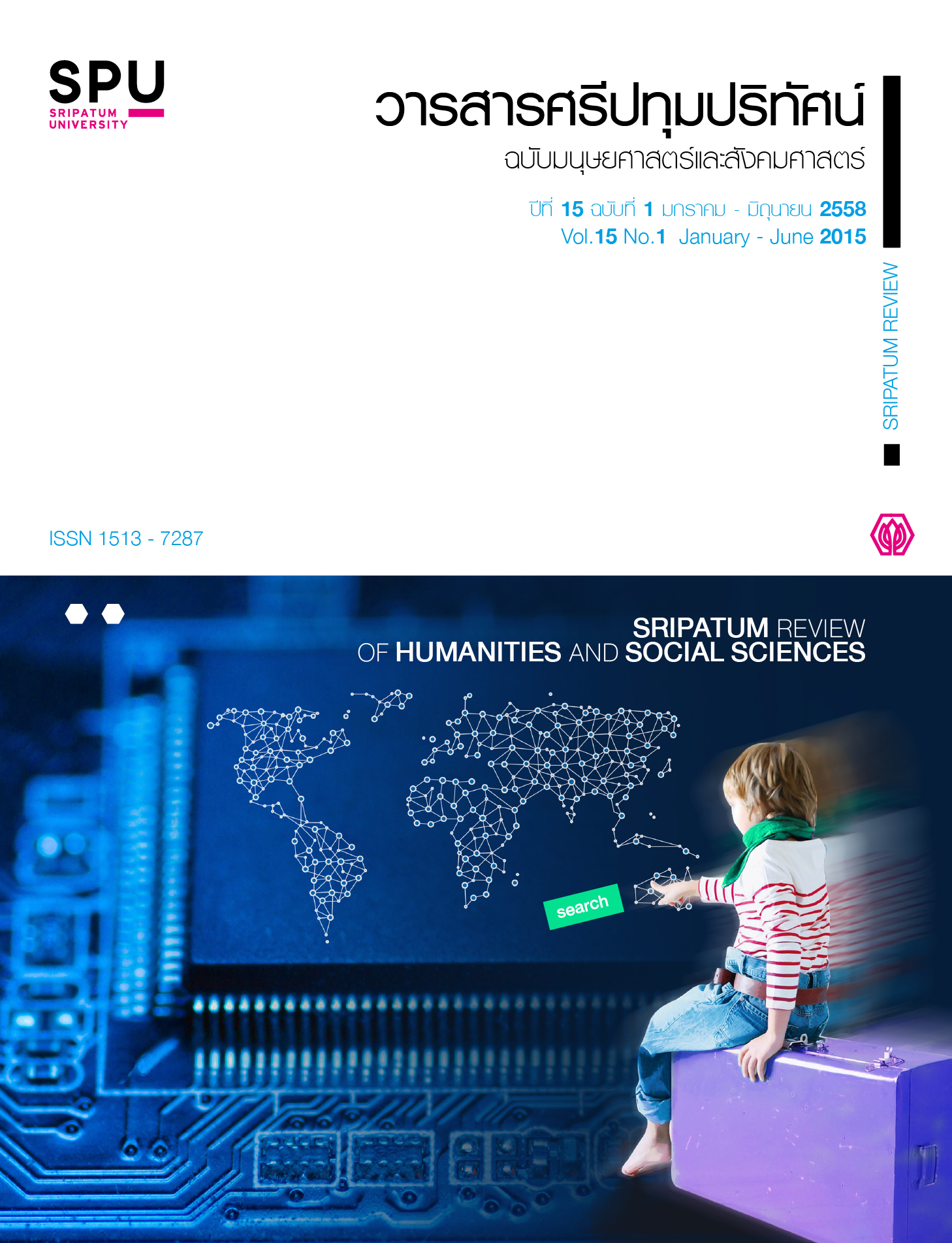PROMOTING THE EDUCATIONAL MANAGEMENT SUCCESS OF NON-FORMAL AND INFORMAL EDUCATION PROVISION IN THAILAND
Main Article Content
Abstract
Promoting the educational management success of non-formal and informal education provision in Thailand is an alternative for adult learners and those who fail to receive education in the formal education system and expect to get an equal chance to receive education. The Office of Non-Formal and Informal Education has used this point as a major goal to mobilize the development consistently in order to support lifelong learning for learners that leads to gaining quality employment thoroughly and equally, which is the upgrading of educational level, learning and problem solving competencies, career development, and life and social quality development. The implementation is applied with all educational institutions under the Office of Non-Formal and Informal Education including 877 district non-formal and informal education centers (NFE District) and 50 district non-formal and informal education centers in Bangkok metropolitan area. As for the operation at the instructional or classroom level, the 8,672 sub-district non-formal and informal education centers perform as the learning centers at the sub-district level. They perform the functions of providing non-formal education, promoting, supporting and coordinating with partnership networks in provision of education with the use of participatory management so that all sectors of society and people have a participatory role in educational management. From documentary study and in-depth interviews, it was found that the factors affecting the educational management success of non-formal and informal education should comprise six factors at the educational institution level: (1) the potential to implement the policy, (2) the management process, (3) leadership of the administrators, (4) cooperation in the workplace, (5) effectiveness of curriculum management, and (6) the assessment of educational quality of the institution; nine factors at the instructional level: (1) the efficiency of instructional management, (2) the promotion of opportunity for lifelong learning, (3) the teacher’s expectations for learners, (4) the assessment and monitoring of learners, (5) teaching ability of the teachers, (6) characteristics of the teachers, (7) instructional media, (8) empowerment, and (9)the learning facilitating climate; and five factors at the learner level: (1) knowledge background of the learners, (2) motivation of the learners, (3) responsibility of the learners, (4) readiness of the learners, and (5) learning skills of the learners.
Article Details
1. กองบรรณาธิการสงวนสิทธิ์ในการพิจารณาและตัดสินการตีพิมพ์บทความในวารสาร
2. บทความทุกเรื่องจะได้รับการตรวจสอบทางวิชาการโดยผู้ทรงคุณวุฒิ แต่ข้อความและเนื้อหาในบทความที่ตีพิมพ์เป็นความรับผิดชอบของผู้เขียนแต่เพียงผู้เดียว มิใช่ความคิดเห็นและความรับผิดชอบของมหาวิทยาลัยศรีปทุม
3. การคัดลอกอ้างอิงต้องดำเนินการตามการปฏิบัติในหมู่นักวิชาการโดยทั่วไป และสอดคล้องกับกฎหมายที่เกี่ยวข้อง
References
ชัยฤทธิ์ โพธิสุวรรณ. 2544. การศึกษาผู้ใหญ่: ปรัชญาตะวันตกและการปฏิบัติ. กรุงเทพฯ: มหาวิทยาลัยเกษตรศาสตร์. 65-68.
บุญชู ชลัษเฐียร. เป็นผู้ให้สัมภาษณ์, ชัยพัฒน์ พันธุ์วัฒนสกุล เป็นผู้สัมภาษณ์ ที่สำนักงานคณะกรรมการการศึกษาขั้นพื้นฐาน กระทรวงศึกษาธิการ กระทรวงศึกษาธิการ เมื่อวันที่ 5 มิถุนายน 2557
ปาน กิมปี. เป็นผู้ให้สัมภาษณ์, ชัยพัฒน์ พันธุ์วัฒนสกุล เป็นผู้สัมภาษณ์ ที่จุฬาลงกรณ์มหาวิทยาลัย เมื่อวันที่ 9 มิถุนายน 2557
รุ่งอรุณ ไสยโสภณ. เป็นผู้ให้สัมภาษณ์, ชัยพัฒน์ พันธุ์วัฒนสกุล เป็นผู้สัมภาษณ์ ที่กลุ่มพัฒนาการศึกษานอกโรงเรียน สำนักงานส่งเสริมการศึกษานอกระบบและการศึกษาตามอัธยาศัย กระทรวงศึกษาธิการ เมื่อวันที่ 26 มิถุนายน 2557
วันเพ็ญ ผ่องกาย. เป็นผู้ให้สัมภาษณ์, ชัยพัฒน์ พันธุ์วัฒนสกุล เป็นผู้สัมภาษณ์, ที่สำนักนโยบายและยุทธศาสตร์ กระทรวงศึกษาธิการ เมื่อวันที่ 3 มิถุนายน 2557
วิรุฬห์ นิลโมจน์. เป็นผู้ให้สัมภาษณ์, ชัยพัฒน์ พันธุ์วัฒนสกุล เป็นผู้สัมภาษณ์ ที่กลุ่มแผนงาน สำนักงานส่งเสริมการศึกษานอกระบบและการศึกษาตามอัธยาศัย กระทรวงศึกษาธิการ เมื่อวันที่ 16 มิถุนายน 2557
วุฒิพล สกลเกียรติ. 2546. การเรียนรู้ผู้ใหญ่และผู้เรียนผู้ใหญ่. กรุงเทพฯ: มหาวิทยาลัยรามคำแหง. 332.
สำนักงานส่งเสริมการศึกษานอกระบบและการศึกษาตามอัธยาศัย. 2551. แก้ปัญหาด้วยกระบวนการคิดเป็น. หนังสือเรียนรายวิชาเลือกสาระทักษะการเรียนรู้ระดับมัธยมศึกษาตอนต้น, สำนักงานส่งเสริมการศึกษานอกระบบและการศึกษาตามอัธยาศัยจังหวัดนครราชสีมา. 26.
สำนักงานส่งเสริมการศึกษานอกระบบและการศึกษาตามอัธยาศัย. 2551. หลักสูตรการศึกษานอกระบบระดับการศึกษาขั้นพื้นฐาน พุทธศักราช 2551. กรุงเทพฯ. รังษีการพิมพ์. 1-10.
อัญชลี ธรรมะวิธีกุล. 2551. หลักการของการจัดการศึกษานอกระบบ และปรัชญาการศึกษาที่เกี่ยวกับการศึกษานอกระบบ. สืบค้นเมื่อ 15 สิงหาคม 2556.
Creemers, B.P.M. 1994. The Effective Classroom. London: Cassell.
Knowles M.S. 1980. The Modern Practice of Adult Education : From Pedagogy to Andragogy. New York: Cambridge, The Adult Education Company. 43.
Purkey, S.C., & Smith, M.S. 1983. Effective schools: a review. The Elementary School Journal, 83(4). 427-452.
Scheerens, J. 1990. School effectiveness research and the development of process indicators of school functioning. School Effectiveness and School Improvement, Lisse: Swets & Zeitlinger. 1(1): 61-80.
Scheerens, J. & Creemers, B.P.M. 1989. Conceptualizing school effectiveness. Developments in school effectiveness research. Special issue of the International Journal of Educational Research, (13)7. Oxford: Pergamon Press. 691-706.
Stringfield, S.C.; & R. Slavin 1992. Raising societal demands, high reliabilty organizations, school effectiveness, "Succes for All", and a set of modest proposals. Enschede, Address to the ICO-symposium.


